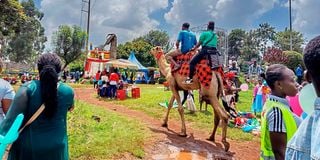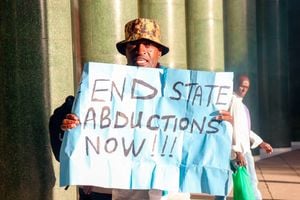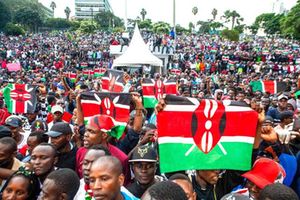
Kenyans celebrate Christmas day with their families in Uthiru on December 25, 2024.
Cabinet Secretary for Energy and Petroleum Opiyo Wandayi recently enumerated the investment his ministry is putting into various projects in his home region.
He revealed that of the Sh12.8 billion negotiated with the African Development Bank, Sh5.7 billion was being allocated to energy projects in the four Luo-dominated counties of Kisumu, Siaya, Migori and Homa Bay. That injection, he said, was fruit of the broad-based government from the political pact between President William Ruto and “former” opposition leader Raila Odinga.
Mr Wandayi, it goes without saying, has also personally benefited from the deal, finding his way from the opposition benches in Parliament to a well-resourced cabinet slot; alongside his ODM party chairman John Mbadi who got the coveted National Treasury docket.
Other beneficiaries from ODM were deputy party leaders and former county governors Ali Hassan Joho and Wycliffe Oparanya, and Beatrice Askul, who served in the party elections coordinating committee.
There is no doubt that formation of an inclusive government helps inject new priorities in allocation of development resources, shifting mindsets from concentration on regions that voted for the government in power.
To that end, Mr Wandayi’s endeavours could be welcomed as affirmative action that re-directs resources to deserving regions that have been historically neglected by successive governments.
There is danger, however, in that the CS was communicating politicisation and ethnicisation of public resource allocation.
Even if there is indisputable need to right past wrongs, it is downright degrading for development funds to be dished out as political bribes.
The picture presented is that ODM regions will benefit for their dalliance with the government, but the taps could be turned off any time the political leaders cease toadying up to President Ruto, or any other president in the future who employs political bribery and blackmail in the budget-making process.
Mr Wandayi and other ODM politicians of similar mien crow about dividends of the broad-based government, but they have clearly not sopped to ponder that they are helping to create a monster, and also condemning their people to further dependence and servitude.
Then there is the whole issue of the ethnic approach. Mr Wandayi was not talking about the wider Nyanza region or even the wider western Kenya region that have been similarly deprived; but narrowing down to the Luo counties.
Cabinet secretaries who approach their jobs from such narrow and small-minded perspectives do not deserve national appointments, and would probably be better suited to serving in county governments.
There are vast regions in this country that have since colonial times been shortchanged in infrastructure projects and other social and economic imperatives.
Much of the entire northern Kenya, the whole of north-eastern and contiguous regions, parts of the coast and southern Kenya have been left in the dark ages due to deliberate neglect and skewed policies.
Not all of those regions and sub-regions at any given time will have the benefit of a son or daughter in the Cabinet to push their case, yet all of them deserve attention.
Development, therefore, cannot be tied to having one in the cabinet or to politicians from a specific region bowing and scraping and pledging undying fealty to the president.
What we need is an approach that takes a broad view of national development priorities, with particular emphasis on redressing past injustices through very deliberate accelerated programmes for all previously neglected areas.
We also need an approach that is forward looking, rather than what we are seeing in abundance of grievance politics forever pointing fingers at communities or regions that supposedly benefited from skewed policies of past regimes. It is very easy to sit back and blame your own inadequacies on past injustices, or on the successes of others.
Pay a visit to Nairobi’s “Little Murang’a” or parts of the Mt Kenya region, and you will meet merchant classes forever grumbling about being edged out by Somali business people and property developers.
My response to the whiners is simple: get off your backside and emulate the Somali. They must be doing something right.
More than probably any other community in independent Kenya, the Somali have been neglected, marginalised and oppressed. The whole of their North Eastern Kenya remains under effective martial law.
They have great challenges just proving their Kenyaness, subjected to intrusive probing on application of national identity cards and passports.
Despite those challenges, they have emerged as the country’s most progressive entrepreneurs, spreading wings all over the republic and beyond without having to suck up to an individual in power. An apt reminder that “development” must not be dependent on political choices.
[email protected]; @MachariaGaitho










